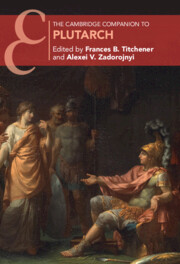Book contents
- The Cambridge Companion to Plutarch
- The Cambridge Companion to Plutarch
- Copyright page
- Contents
- Figures
- Contributors
- Acknowledgments
- Introduction
- Chapter 1 Plutarch and Biography
- Chapter 2 Romanness and Greekness in Plutarch
- Chapter 3 Plutarch As Moral and Political Educator
- Chapter 4 In the Spirit of Plato
- Chapter 5 Plutarch As a Polemicist
- Chapter 6 Religion and Myth in Plutarch
- Chapter 7 Plutarch at the Symposium
- Chapter 8 Language, Style, and Rhetoric
- Chapter 9 Plutarch and Classical Greece
- Chapter 10 Great Men
- Chapter 11 Thinking “Private Life”
- Chapter 12 Wealth and Decadence in Plutarch’s Lives
- Chapter 13 Plutarch and the Barbarian “Other”
- Chapter 14 Plutarch and Animals
- Chapter 15 Plutarch in Byzantium
- Chapter 16 Plutarch in the Italian Renaissance
- Chapter 17 Plutarch and the Spanish Renaissance
- Chapter 18 Plutarch and Shakespeare
- Chapter 19 Plutarch in France
- Bibliography
- Appendix: Plutarch’s Moralia
- Index Locorum
- Index
- Cambridge Companions To …
Chapter 7 - Plutarch at the Symposium
Published online by Cambridge University Press: 29 June 2023
- The Cambridge Companion to Plutarch
- The Cambridge Companion to Plutarch
- Copyright page
- Contents
- Figures
- Contributors
- Acknowledgments
- Introduction
- Chapter 1 Plutarch and Biography
- Chapter 2 Romanness and Greekness in Plutarch
- Chapter 3 Plutarch As Moral and Political Educator
- Chapter 4 In the Spirit of Plato
- Chapter 5 Plutarch As a Polemicist
- Chapter 6 Religion and Myth in Plutarch
- Chapter 7 Plutarch at the Symposium
- Chapter 8 Language, Style, and Rhetoric
- Chapter 9 Plutarch and Classical Greece
- Chapter 10 Great Men
- Chapter 11 Thinking “Private Life”
- Chapter 12 Wealth and Decadence in Plutarch’s Lives
- Chapter 13 Plutarch and the Barbarian “Other”
- Chapter 14 Plutarch and Animals
- Chapter 15 Plutarch in Byzantium
- Chapter 16 Plutarch in the Italian Renaissance
- Chapter 17 Plutarch and the Spanish Renaissance
- Chapter 18 Plutarch and Shakespeare
- Chapter 19 Plutarch in France
- Bibliography
- Appendix: Plutarch’s Moralia
- Index Locorum
- Index
- Cambridge Companions To …
Summary
This chapter assesses the cultural and broader symbolic significance of the symposium in Plutarch’s biographical and philosophical works. It begins by situating Plutarch’s references to the symposium in their cultural context, by examining the symposium/convivium as a key social institution in the Roman imperial period. Next, the chapter discusses the symbolic dimension of conviviality in Plutarch’s oeuvre, through characteristic examples from the Lives and Moralia. It underlines that, for Plutarch, the symposium serves as a tool for evaluating moral character, as well as for conducting cross-cultural comparison. In addition, Plutarch’s interest in philosophical dietetics turns consumption patterns and behaviour at symposia into an important point of focus and concern. The last two sections look closely at Plutarch’s two surviving sympotic works, the Banquet of the Seven Sages and Table Talk. It discusses their genre and literary techniques, their relationship to the philosophical tradition of sympotic writing initiated by Plato and Xenophon, and the central role they both assign to philosophical enquiry.
Keywords
- Type
- Chapter
- Information
- The Cambridge Companion to Plutarch , pp. 138 - 156Publisher: Cambridge University PressPrint publication year: 2023

